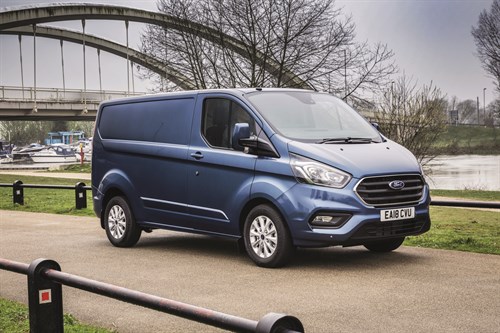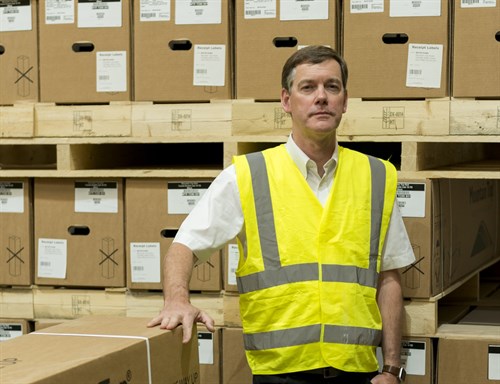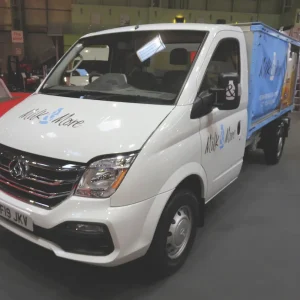The coronavirus pandemic and associated lockdown measures have meant dramatic changes for all of our personal and professional lives over the past few months, and the LCV industry is no exception. From manufacturers pausing production and closing dealerships, to suppliers facing reduced or even entirely lost demand, the challenges have been substantial. But as the UK now begins to tentatively emerge from lockdown, what damage has been done to the industry, and what are its prospects for the coming months?
While the new van market largely had the shutters put up by the lockdown – year-on-year UK sales fell by 86.2% during April, and by 74.1% in May – one company that fared better than most was Mercedes-Benz, which saw its Sprinter become not just the best-selling van, but the best-selling vehicle in the UK in April – the first time a van had outsold the most popular car for 30 years.
Although Mercedes-Benz Vans UK MD Steve Bridge acknowledges that the lockdown still meant a significant drop in sales for the firm – which kept 97% of its dealer workshops open with a focus on maintaining front-line and key business vehicles – he says it is well placed to rebound: “Our order intake is very quickly gaining momentum, remains on an upward trend, and we are pretty close to being back at our target line for the year. Sprinter orders remain strong and Vito orders are growing too.
“We are also seeing solid levels of used vehicle sales, which remains the strongest performance as a year-on-year comparison.
“We are preparing for a big used focus this year, but are expecting the new vehicle sales market to recover to normal levels this year.”
When asked if factory closures meant potential vehicle supply issues as dealerships reopen, Bridge says he is confident this will not be an issue: “The factories were closed for between five and seven weeks, but they are all back up and running at full capacity now, so all models are returning to normal levels very quickly.
“We have seen some of our large eGrocery customers recommission their previously returned vehicles, which has been a huge undertaking, but has meant that the immediate need for supply has been addressed quickly.”
As for changes to the way Mercedes operates, Bridge says the company has been helped by operational changes that had already been put in place before the pandemic hit: “We implemented an agile working culture shift and business digitalisation shift two years ago, which meant that when the lockdown happened, we were all fully equipped and used to remote working, so we experienced no reduction in productivity.
“This episode has cemented the need to accelerate our shift to online sales and focus on digitalisation. There will be changes to our sales mix and different segment demands as customers adapt to the ‘new normal’ in their day-to-day business, working with our customers to find the best mobility solution for them, be that the latest diesel vehicle, or electric, with various ownership options.
“This hasn’t changed during the pandemic, nor will it change moving forwards; putting customers at the centre of all we do to keep their businesses moving is what we have done and what we continue to do.”
Although Mercedes topped the LCV sales chart in April, the regular UK market leader is, of course, Ford, and its Transit Custom regained its customary place on top of the LCV sales chart in May. The company says it is seeing renewed demand across Europe as markets start to reopen, with social distancing measures having been introduced at dealerships, while the firm’s factories have also reopened.

A spokesperson says: “All Ford plants were initially closed during the Covid pandemic outbreak to comply with local government restrictions.
“Now, all LCV plants have reopened and manufacturing is ramping up, including the supply of raw materials.
“We are working closely with our supply base to ensure that the ramp-up is aligned to current demand, and as sales volumes increase, we have planned the ramp-up to ensure we can meet the demand.”
The spokesperson adds that during the height of the pandemic, Ford deployed much of its LCV demo fleet to help fight the crisis in many countries, and also, where it was possible to work with conversion partners, it brought forward the likes of supermarket delivery and blue light vehicles.
While the reopening of dealerships was clearly a key moment for manufacturers, it was also crucial for other areas of the LCV industry. Most of pick-up accessories firm Truckman’s sales are linked to purchases of new vehicles, so while showrooms were shut, its own sales were also stopped “to all intents and purposes”, according to executive chairman Mike Wheeler.
“The dealers coming back is pivotal to the whole automotive industry. As soon as the dealers stopped that just turned off our sales,” he says.
“We were still dispatching spares. A lot of our products are used by emergency services, support services, construction, so we kept spare parts moving.”
Now dealerships are reopening, Wheeler is hopeful that sales will recover, but says it is tough to predict the rate at which this will happen.
“It’s hard to call really which way it will go, but I think once the dealerships start moving we will see a significant pick-up in sales. I don’t think it will return to the volumes we had like flicking a light switch, but we will see sales beginning to return.
“At the end of the day, most people buy these vehicles for dual purpose – they are work vehicles and then used for transporting people, so if you need a new pick-up you need a new pick-up.
“Emergency services and fleet operators can put off buying for a while, but they can’t put it off forever. It’s an intrinsic part of their business and supply chain to have pick-ups that go and fix things and deliver things.
“We are quietly optimistic that things will come back relatively quickly.”
When the UK lockdown was enforced, Truckman took on more warehousing space to accommodate unsold stock, and Wheeler says this contingency plan was successful: “We had effectively six weeks of production on the water [shipping from the factory in Thailand], when the lockdown came, so we had all this stuff coming in and nothing coming out, so our supply chain was completely out of balance.

“Now we’ve just started shipping containers out of Thailand again, so hopefully they will start coming in as space is being generated.
“Deciding how to restart the supply chain I think is the most difficult part of this crisis. You have got to make assumptions that sales are going to come back.
“The question is to what level, and what will be the impact if we have a second wave and a second lockdown? It’s difficult but it is what it is.”
While new van sales were greatly reduced during the lockdown, demand for rental vans continued, according to David Brennan, CEO of Nexus Vehicle Rental.
He says: “Van rental has remained a strong vehicle category for us during Covid-19 and we see this continuing given the nature of our customer portfolio. Demand will further rise as businesses return to a new way of safe working, and the last few weeks have seen an increase in demand across businesses operating in construction, utilities, and supermarkets in particular.
“We are now seeing other sectors follow suit. It is difficult to say whether we will see a spike in demand once the government’s measures relax further – at this stage there remains too many unanswered questions with how businesses plan on returning to work.”
In the vehicle remarketing sector, one recent trend that seems to have put firms in a better position to cope with the need for socially distanced operations is the increase in online sales, meaning they can carry out business without having buyers packed into a physical auction hall.
Auction firm Aston Barclay held its first and second online used LCV sales post-lockdown on 28 May and 4 June and says demand was “very, very strong”.
LCV sales manager Geoff Flood says: “Bidding was brisk with us selling 97% of the stock with prices averaging at 111% of Cap Average. Both these conversion ratios and average prices are record performances for the group and a sign of how buoyant the used LCV market has been heading out of lockdown.
“The majority of van traders have been selling stock online during lockdown and many have confirmed they are using their government loans to help fund new stock.”
Flood says Aston Barclay believes strong demand and prices may last for the rest of June, but adds: “Prices can’t keep at this level forever. More fleets are extending contracts due to the delay in many new vans being manufactured and delivered to dealers.
“This means we could see a shortage of used stock in July and August, or certainly until the OEMs get their production facilities fully operational.
“This may fuel prices again, but traditionally these are the slower months for LCV sales activity.”
Although physical sites are currently closed, Aston Barclay has also developed new processes to enable social distancing once it reopens, including installing Perspex screens and hand gel stations.
According to Alex Wright, MD of Shoreham Vehicle Auctions, the used van market came out of lockdown with high conversion rates and prices up to 10% above Cap Average, helped by the government’s Bounce Back Loan Scheme for smaller businesses.
He says: “Many smaller independent van retailers had been selling online throughout lockdown, but with no part exchange or de-fleeted leasing vehicles coming into the market there has been a pent-up demand with little or no replacement stock for them to buy.
“With many extended leasing contracts in the market, stock is likely to be thin on the ground throughout the summer and prices will remain strong.
“Many fleets have extended their replacement cycles, which together with OEMs working to get their new van production levels up to speed means there will be a shortage of used stock in the market for the rest of 2020.
“In turn, because of the fall in new van sales in March, April and May 2020 we will see a shortage in 20-plate stock coming into the market during 2021. By then, market prices should have calmed down and 2021 looks like being a strong used LCV market.”
One effect of the pandemic that van operators are sure to have noticed is a dramatic fall in the price of fuel, which has dropped to a level not seen for several years.
According to Paul Holland, MD for UK fuel at fuel card firm Fleetcor, prices are likely to remain relatively low for some time yet.
“Ultimately, oil price is driven purely by demand, and by threat to supply really, and the way the market is viewing things is clearly there is no immediate prospect of fuel prices increasing because the demand is not going to increase,” he says.
“Over the next six to eight months, the market suggests that prices might move up by maybe six or so pence a litre, but I think the reality is it’s a perspective that has got very little validation because it is all going to be about the economy. The economy is going to drive fuel consumption, fuel consumption will therefore increase demand, and demand will therefore push up fuel prices.”
Holland says that Fleetcor was not surprised that fuel prices dropped as much as they did – although he says forecourt prices have not fallen as far as oil prices as retailers account for reduced sales – but says that when it comes to recovery predictions, “to a degree it is anybody’s guess”.
He adds: “We don’t know quite where the market is going to be when we come out of lockdown, the global oil producers don’t know, and certainly the traders and the market makers, who trade oil probably 10 times for every barrel that comes out of the ground, have no perspective either.
“So it is a lot of conjecture, but is really about what is the size of the global economy once we start to come out of the impact of pandemic.”
On what van operators can do to help drivers refuel safely, Holland acknowledges options may be limited, but says there are some potentially useful tips: “If you have a van and you are driving the van you have to put fuel in it, so there is very little that you can do on an operational aspect at the actual point of filling. From discussions with our customers there is a lot of guidance being given to drivers about the need to use gloves when refuelling and to wash hands regularly after visiting fuelling establishments, so I think that is key.
“I think we are also seeing some other operational components coming into play, where some companies are actually asking their drivers to take vans home at night rather than return them to base, so they keep the same vehicle, rather than go through all that risk of multiple drivers in vans.”





